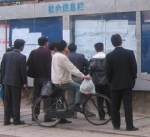Jim Richmond's Note: I wrote the following reflections in 2002, while living in China. Last week (9/06/2005), China's top 200 political leaders met in Beijing to carve out political and social priorities for the next five years. Number one on their list -- still -- the growing disparity between rich and poor.
SHENZHEN, PRChina -- On my daybreak bicycle ride here, a man screamed a profanity when I snapped a photo of Chinese reading a street poster of menial job openings.
In this nation with a much-envied Gross Domestic Product (GDP) growth rate of 7 percent (compared with 2.4  percent in the U.S.), there is still much poverty. People just do not talk – or easily take photographs – of it.
percent in the U.S.), there is still much poverty. People just do not talk – or easily take photographs – of it.
Twenty-six percent of adult males in this southeast coastal city do not have jobs. Across China, about the same geographic size as the United States, there are 120 million rural citizens without work – roughly 10 percent of the total population.
Still, apartment construction projects are everywhere.
The projects are part of xiaokang, China’s economic and social development goal for the decade ahead. 44.4 million housing units were built in China last year; compared with 1.84 million in the United States.
The projects provide work for millions of unskilled and often illiterate peasants who are moving to China’s major cities in order to avoid rural poverty. The jobs help temporarily “keep the lid on” this society that is increasingly stratified between poor, middle class and the wealthy.
The United States and its cities have their own problems, of course.
Recent. newspaper editorials and politicians are calling for the U.S. to give increased priority to knowledge, education, and technological innovation.
Meanwhile, China is graduating more university-trained engineers, chemists and I/T professionals than the United States.
A new "generation" of business development occurs every three years along China's industrialized southeast coast from Dalian on the north to Hong Kong to the south.
China is moving away from joint ventures with foreign firms to wholly own technology-dependent consumer items.
Chinese manufacturers have taken over televisions, microwave ovens, air conditioners, washing machines, refrigerators, personal computers and telecom switching equipment – sectors once dominated by foreign brands,
The question is no longer whether American and European products can dominate this huge technology and consumer driven market.
That door is being closed.
And as Jeff Immelt, the blunt-spoken new CEO of 300,000–employees General Electric recently said: “We have to get off our butts in America. Before it’s too late.”

 percent in the U.S.), there is still much poverty. People just do not talk – or easily take photographs – of it.
percent in the U.S.), there is still much poverty. People just do not talk – or easily take photographs – of it.